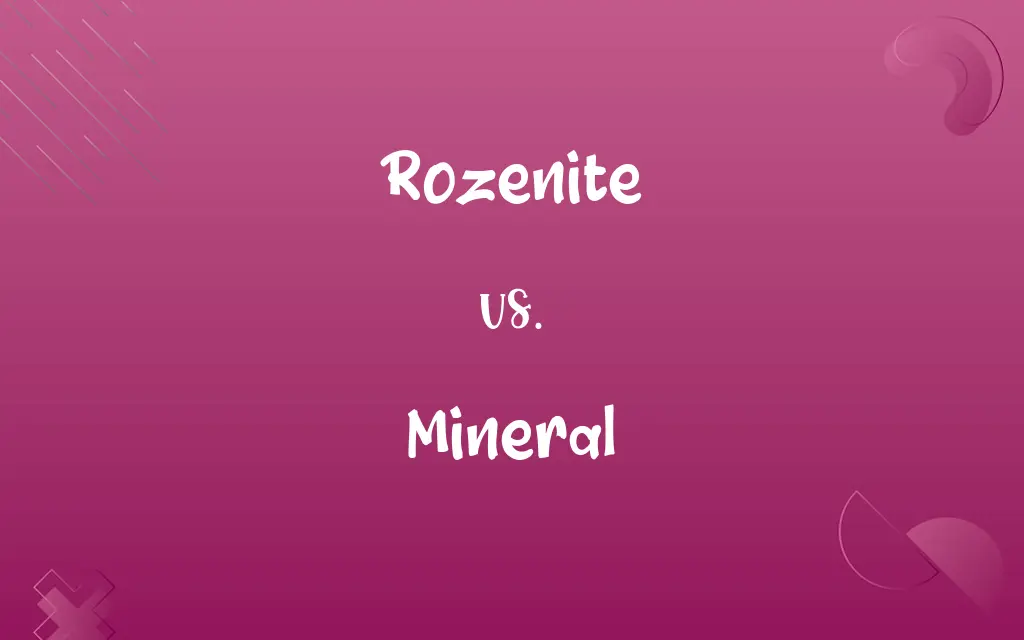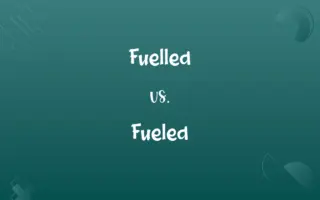Rozenite vs. Mineral: Know the Difference

By Shumaila Saeed || Updated on December 29, 2023
Rozenite is a specific mineral species, whereas "mineral" is a general term for naturally occurring inorganic substances with a defined chemical composition and crystalline structure.

Key Differences
Rozenite is a distinct mineral known for its specific chemical composition, typically iron sulfate with water molecules. In contrast, the term "mineral" broadly encompasses a wide range of naturally occurring inorganic substances, each with unique chemical compositions and physical properties.
Shumaila Saeed
Dec 29, 2023
Rozenite forms through the alteration of other iron sulfate minerals, making it a secondary mineral with characteristic crystalline structures. On the other hand, minerals can be either primary (formed directly from cooling magma) or secondary (formed from the alteration of other minerals).
Shumaila Saeed
Dec 29, 2023
In the world of mineralogy, Rozenite is recognized for its white to pale blue color and fibrous crystals. Conversely, the category of minerals includes a vast array of colors, forms, and textures, ranging from metallic to non-metallic and from crystalline to amorphous.
Shumaila Saeed
Dec 29, 2023
Rozenite, specifically, has applications in studying geological processes and mineral formation. Minerals, in general, have diverse applications, including in industry, technology, and jewelry, reflecting their varied physical and chemical properties.
Shumaila Saeed
Dec 29, 2023
While Rozenite is a specific example with a defined place in the mineral classification system, the concept of a mineral is fundamental to geology, encompassing thousands of known species, each with its distinct characteristics and significance.
Shumaila Saeed
Dec 29, 2023
ADVERTISEMENT
Comparison Chart
Definition
A specific mineral species.
A broad term for inorganic substances.
Shumaila Saeed
Dec 29, 2023
Appearance
White to pale blue, fibrous.
Diverse, from metallic to non-metallic.
Shumaila Saeed
Dec 29, 2023
Uses
Geology and mineralogy studies.
Wide-ranging, from industry to jewelry.
Shumaila Saeed
Dec 29, 2023
ADVERTISEMENT
Classification
Specific place in mineral system.
General category encompassing many types.
Shumaila Saeed
Dec 29, 2023
Rozenite and Mineral Definitions
Rozenite
Rozenite is a secondary mineral in sulfide ore deposits.
In this ore deposit, Rozenite formed from the breakdown of primary iron sulfides.
Shumaila Saeed
Dec 29, 2023
Mineral
A mineral is a naturally occurring inorganic substance.
Quartz is a common mineral found in many types of rocks.
Shumaila Saeed
Dec 29, 2023
Rozenite
Rozenite is a hydrous iron sulfate mineral.
The pale blue crystals in the rock were identified as Rozenite.
Shumaila Saeed
Dec 29, 2023
Mineral
Minerals have a definite chemical composition.
The mineral calcite is always composed of calcium, carbon, and oxygen.
Shumaila Saeed
Dec 29, 2023
ADVERTISEMENT
Rozenite
Rozenite has a distinctive white to pale blue color.
The pale blue streaks in the geode are due to Rozenite.
Shumaila Saeed
Dec 29, 2023
Mineral
Minerals possess a crystalline structure.
The crystal structure of diamonds makes them one of the hardest minerals.
Shumaila Saeed
Dec 29, 2023
Rozenite
Rozenite is known for its fibrous crystal habit.
The fibrous texture of this specimen indicates it's Rozenite.
Shumaila Saeed
Dec 29, 2023
Mineral
Minerals are identifiable by specific physical properties.
The mineral pyrite is easily recognizable by its metallic luster and gold color.
Shumaila Saeed
Dec 29, 2023
Rozenite
Rozenite forms through the alteration of other iron sulfates.
The presence of Rozenite suggests the rock underwent significant chemical changes.
Shumaila Saeed
Dec 29, 2023
Mineral
Minerals are categorized based on their composition and structure.
Minerals like halite are classified as evaporites due to their formation process.
Shumaila Saeed
Dec 29, 2023
Rozenite
(mineral) An iron sulphide mineral with chemical formula FeSO4·4H2O.
Shumaila Saeed
Oct 19, 2023
Mineral
A naturally occurring, homogeneous inorganic solid substance having a definite chemical composition and characteristic crystalline structure, color, and hardness.
Shumaila Saeed
Oct 19, 2023
Mineral
A substance, such as stone, sand, salt, or coal, that is extracted or obtained from the ground or water and used in economic activities.
Shumaila Saeed
Oct 19, 2023
Mineral
A substance that is neither animal nor vegetable; inorganic matter.
Shumaila Saeed
Oct 19, 2023
Mineral
An inorganic element, such as calcium, iron, potassium, sodium, or zinc, that is essential to the nutrition of humans, animals, and plants.
Shumaila Saeed
Oct 19, 2023
Mineral
(geology) Any naturally occurring inorganic material that has a (more or less) definite chemical composition and characteristic physical properties.
Shumaila Saeed
Oct 19, 2023
Mineral
Any inorganic material (as distinguished from animal or vegetable).
Shumaila Saeed
Oct 19, 2023
Mineral
(nutrition) Any inorganic element that is essential to nutrition; a dietary mineral.
Shumaila Saeed
Oct 19, 2023
Mineral
An inorganic species or substance occurring in nature, having a definite chemical composition and usually a distinct crystalline form. Rocks, except certain glassy igneous forms, are either simple minerals or aggregates of minerals.
Shumaila Saeed
Oct 19, 2023
Mineral
Anything which is neither animal nor vegetable, as in the most general classification of things into three kingdoms (animal, vegetable, and mineral).
Shumaila Saeed
Oct 19, 2023
Mineral
Of or pertaining to minerals; consisting of a mineral or of minerals; as, a mineral substance.
Shumaila Saeed
Oct 19, 2023
Mineral
Solid homogeneous inorganic substances occurring in nature having a definite chemical composition
Shumaila Saeed
Oct 19, 2023
Mineral
Of or containing or derived from minerals;
A mineral deposit
Mineral water
Decaying vegetable matter
Shumaila Saeed
Oct 19, 2023
Mineral
Composed of matter other than plant or animal;
The inorganic mineral world
Shumaila Saeed
Oct 19, 2023
Repeatedly Asked Queries
How does Rozenite form?
Rozenite typically forms through the alteration of other iron sulfate minerals.
Shumaila Saeed
Dec 29, 2023
What are the physical characteristics of Rozenite?
Rozenite is characterized by its white to pale blue color and fibrous crystals.
Shumaila Saeed
Dec 29, 2023
What defines a mineral?
A mineral is a naturally occurring, inorganic substance with a defined chemical composition and crystalline structure.
Shumaila Saeed
Dec 29, 2023
What is Rozenite?
Rozenite is a specific type of mineral known for its iron sulfate composition.
Shumaila Saeed
Dec 29, 2023
Do all minerals have crystals?
Yes, all minerals have a crystalline structure, though the size and visibility of the crystals can vary.
Shumaila Saeed
Dec 29, 2023
What is the use of Rozenite?
Rozenite is primarily used in geological and mineralogical studies.
Shumaila Saeed
Dec 29, 2023
Do minerals have economic value?
Many minerals have significant economic value, especially those used in industry, technology, and jewelry.
Shumaila Saeed
Dec 29, 2023
What is the hardness of Rozenite?
The hardness of Rozenite varies but it's generally considered a soft mineral.
Shumaila Saeed
Dec 29, 2023
How are minerals classified?
Minerals are classified based on their chemical composition and crystal structure.
Shumaila Saeed
Dec 29, 2023
Does Rozenite have any industrial applications?
Rozenite is not commonly used in industry; it's more important for scientific study.
Shumaila Saeed
Dec 29, 2023
Are all rocks made of minerals?
Most rocks are composed of minerals, though some, like obsidian, are glassy and lack a crystalline structure.
Shumaila Saeed
Dec 29, 2023
Can Rozenite be found in jewelry?
Rozenite is not typically used in jewelry due to its softness and rarity.
Shumaila Saeed
Dec 29, 2023
Are minerals renewable resources?
Minerals are considered non-renewable as they take very long periods to form.
Shumaila Saeed
Dec 29, 2023
What distinguishes Rozenite from other minerals?
Rozenite is distinguished by its specific chemical formula and physical properties.
Shumaila Saeed
Dec 29, 2023
Is Rozenite a common mineral?
Rozenite is not as common as some other minerals and is typically found in specific geological settings.
Shumaila Saeed
Dec 29, 2023
Can minerals be synthetic?
While synthetic equivalents exist, naturally occurring substances are required to be classified as minerals.
Shumaila Saeed
Dec 29, 2023
Is color a reliable way to identify minerals?
While color can be indicative, it's not always reliable due to variations and impurities.
Shumaila Saeed
Dec 29, 2023
What environments does Rozenite typically form in?
Rozenite often forms in oxidized zones of sulfide ore deposits.
Shumaila Saeed
Dec 29, 2023
Can minerals be found everywhere?
Minerals are found worldwide, but their type and concentration vary greatly depending on the geological conditions.
Shumaila Saeed
Dec 29, 2023
Share this page
Link for your blog / website
HTML
Link to share via messenger
About Author
Written by
Shumaila SaeedShumaila Saeed, an expert content creator with 6 years of experience, specializes in distilling complex topics into easily digestible comparisons, shining a light on the nuances that both inform and educate readers with clarity and accuracy.









































































